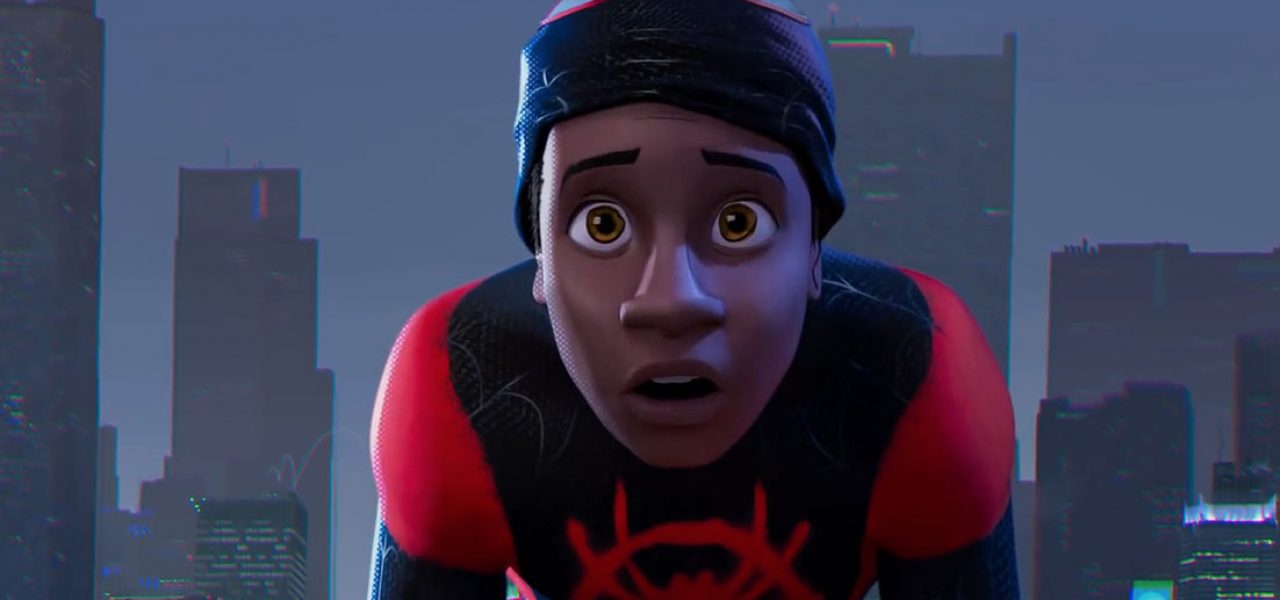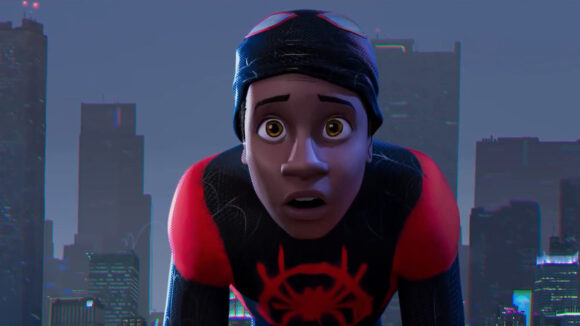

‘Spider-Man: Into the Spider-Verse’ Launches 100% Fresh On Rotten Tomatoes
The first batch of reviews are in for Sony Picture Animation’s Spider-Man: Into the Spider-Verse and they’re not just good — they’re great!
After 33 reviews, the film boasts a 100% positive rating on the review aggregation platform Rotten Tomatoes, and while the film clearly won’t stay at 100% after all its reviews are published, it’s a reassuring start for a film that doesn’t follow the American feature animation template.
For all its familiar elements — a big-budget animation production and an iconic superhero brand — the film is still something of an anomaly in the marketplace because it aims for a non-standard animation audience – kids will probably enjoy it, but it’s not a kids-first movie, instead targeting a more pop culture-savvy and slightly older teen crowd. This shouldn’t feel so revolutionary in 2018, but in our creatively underdeveloped animation marketplace, there’s literally nothing else that feels (or looks) like this film.
Spider-Verse has proven so confounding to Hollywood that it’s box office potential is not being tracked as either a typical big-budget animated film or a live-action superhero film, a fact that we’ve pointed out a few times on Twitter.
Someone needs to explain to me why @BoxOffice's tracking is so slow on "Spider-Man: Into The Spider-Verse." The film looks like it's going to be much bigger than this. /1 pic.twitter.com/ZgoUX63EX8
— Cartoon Brew (@cartoonbrew) November 21, 2018
The six live-action Spider-Man films have opened between $62-151M. It’s still hard to understand why an animated film of the same character brand would be projected at $30-40M. We’re bullish on how it will perform compared to these projections.
— Cartoon Brew (@cartoonbrew) November 21, 2018
The previous six live-action Spider-Man films launched with opening weekends ranging from $62-151 million, yet until last week, Spider-Verse was being tracked to launch in the low-$20 million range. Those numbers have edged slightly upward over the past week into the upper-twenty to mid-thirty-million range, but Hollywood has as yet been reluctant to acknowledge that this film could appeal to a broad superhero-loving audience.
It’s weird to be talking about Spider-Man as an underdog, but until now that’s been the status of the film in broader Hollywood. The new batch of reviews, not to mention the growing fan buzz, should give the movie a boost, reaffirming that it’s a legitimate film with real potential to connect with audiences. Below are a few highlights from reviewers.
Brian Truitt in USA Today:
“In the wake of comic-book legend (and Spidey creator) Stan Lee’s death, the film acts as a loving tribute to his life lesson that there’s a little hero in all of us. And it’s a slightly insane, hilariously daring and often touching mashup of everything that makes super-flicks so darn popular with the introduction of a Spider-Man who’s ready-made for today’s generation of kids.…The two-hour run time and non-stop flashback stories for pretty much every main player might test the patience of the littlest young ‘uns, but Spider-Verse does so much more right on the way to being this year’s best animated movie.”
David Ehrlich in Indiewire:
“Tragic news for anyone who’s sick of superhero movies: Spider-Man: Into the Spider-Verse completely reinvigorates the genre, reaffirms why it’s resonating with a diverse modern audience that’s desperate to fight the power, and reiterates to us how these hyper-popular spandex myths are able to reinvent themselves on the fly whenever things get stale.…[E]very single frame oozes with fan service, and yet the entire project seems optimized for people who were rooting for Thanos to snap the Avengers into oblivion and put us all out of our misery.”
Justin Chang in the Los Angeles Times:
“It’s a sign of a movie not just embracing its hand-drawn comic-book roots, but also striving to be the fullest, truest version of itself it can be. Which is what, in the end, nearly everyone who dons the Spidey mask in this movie is trying to achieve, especially Miles, a young man of Puerto Rican and African American heritage who pointedly doesn’t look like a lot of the young webslingers who have come before him. That creative decision might have felt like a merely tokenistic gesture, of course, if he weren’t such a richly and coherently imagined character in the bargain.”
Peter Debruge in Variety:
“[T]he brilliance of Sony’s snappy new animated Spider-Man: Into the Spider-Verse shows itself in the project’s uncanny ability to simultaneously reset and expand all that has come before, creating an inclusive world where pretty much anybody can be the superhero … even you!”
It’s not a perfect movie by any means, and reviewers have repeatedly pointed out similar flaws, even if their overall impression of the film was positive. Todd McCarthy in The Hollywood Reporter reflects a typical line of criticism about the film:
“There’s an upside and a downside to these multiverses. Of benefit is the constant surprise, the sheer variety of visuals and plunges into fun-house craziness. The increasingly abundant negatives are sensory overload and overkill, a feeling that the film it pitched first and foremost to the insider geek contingent that will get all the jokes and references, plus a growing sense that nothing matters because it’s dealing in ephemeral realms that come and go in a flash, which they indeed do. Cumulatively, the result is that, just as things should be excitingly building to a rousing climax, nothing sticks, nothing matters. By the time it feels that, by rights, the film should be hitting its climax and wrapping things up, it pitches headlong into Geek-Verse and keeps spinning around there for far too long.”
Spider-Man: Into the Spider-Verse will be released in the U.S. on December 14, 2018. Bob Persichetti (head of story, The Little Prince, Puss in Boots), Peter Ramsey (director, Rise of the Guardians), and Rodney Rothman (head writer, Late Show with David Letterman) direct the film from a script by Rothman and Phil Lord (The Lego Movie, 21 Jump Street).
Film is produced by Avi Arad, Amy Pascal, Phil Lord, Chris Miller, and Christina Steinberg. Sony Pictures Imageworks is the animation studio.
